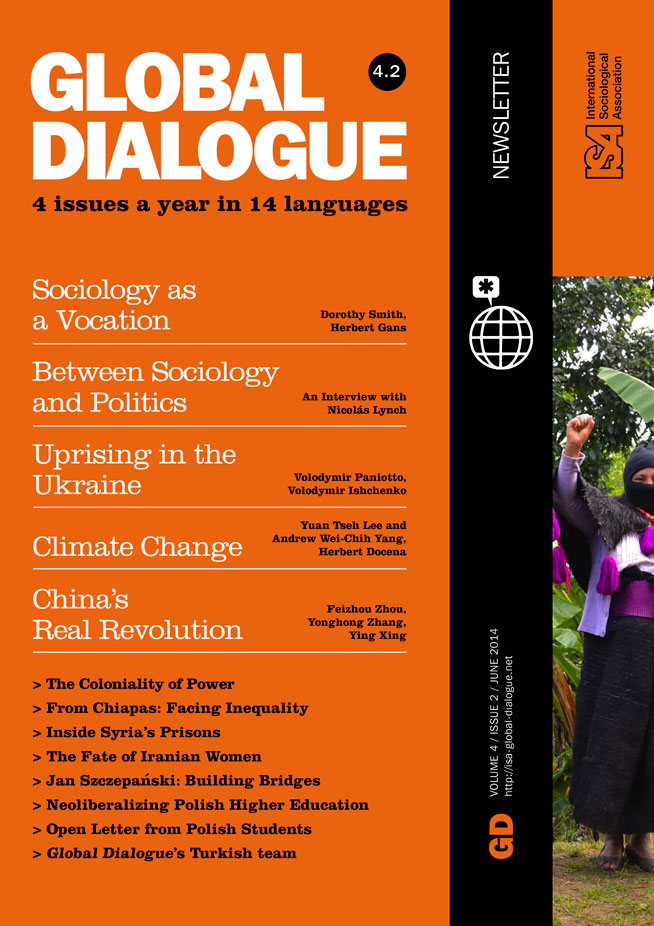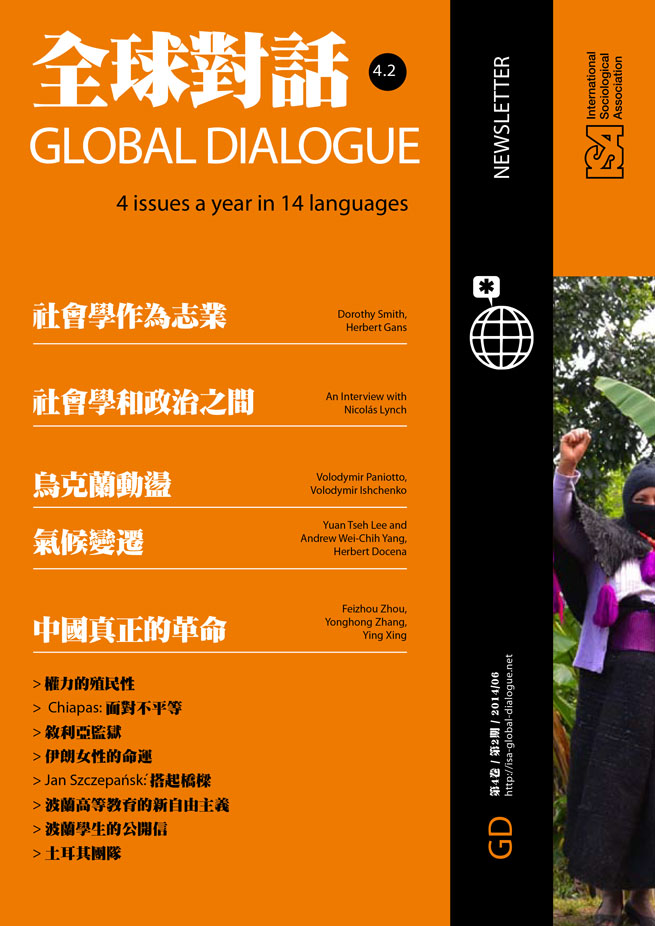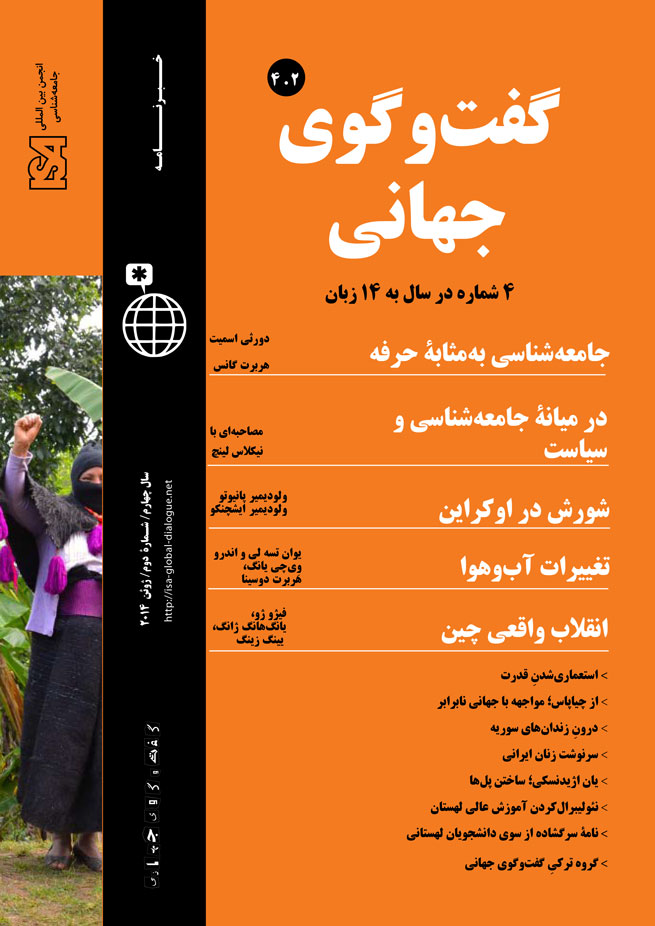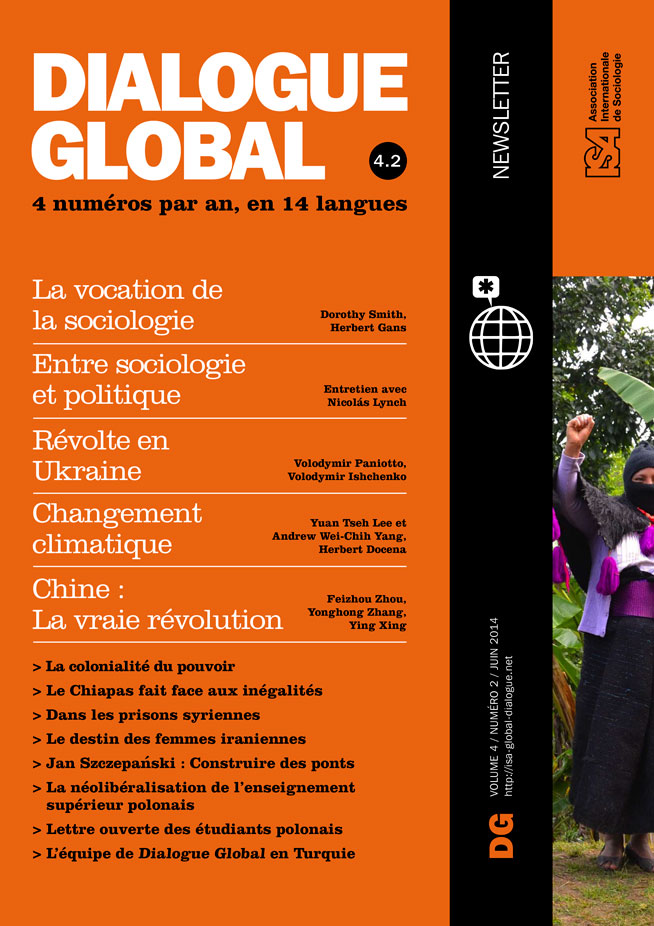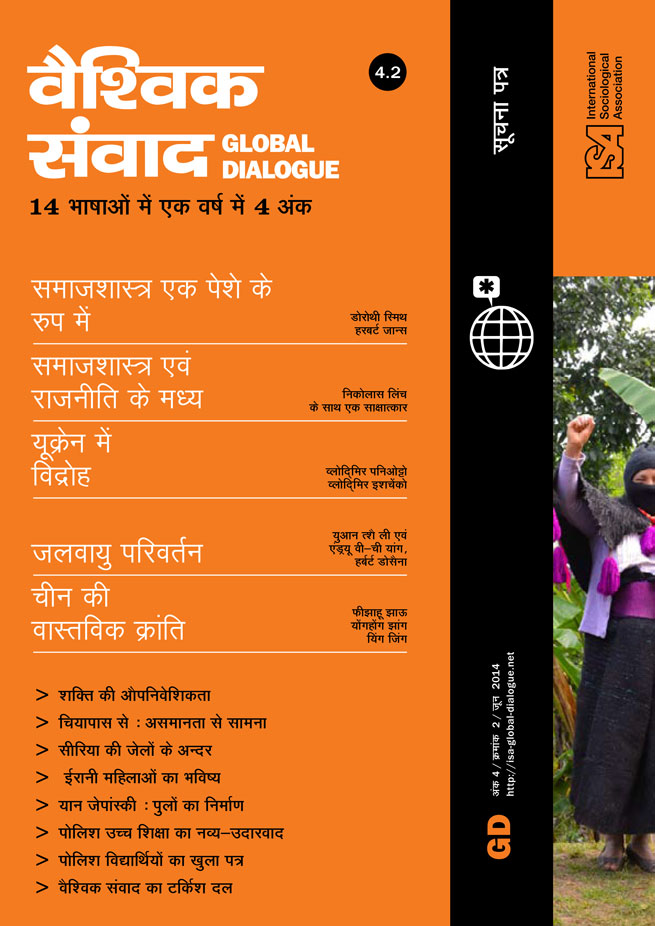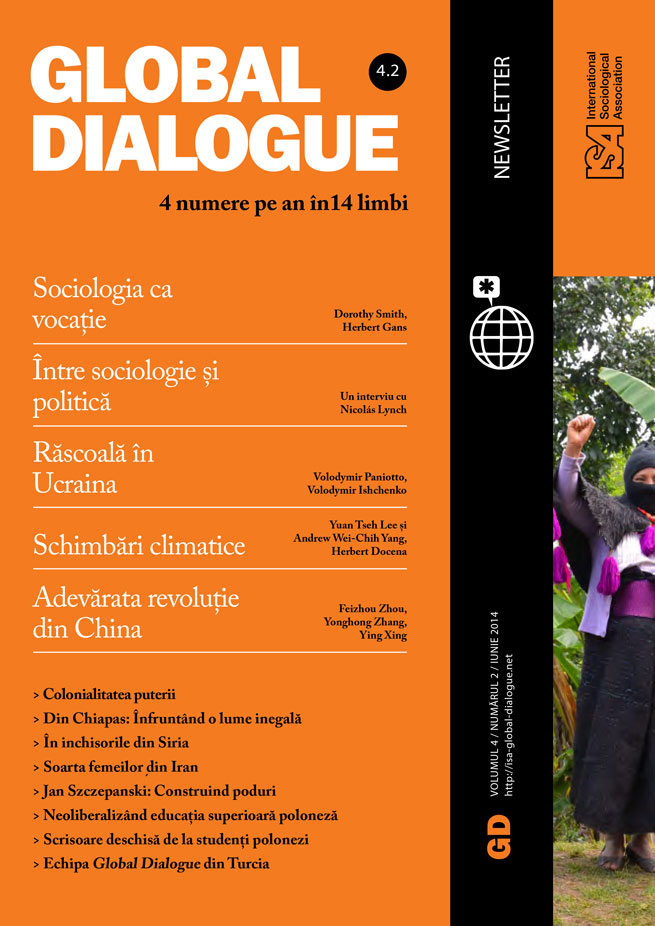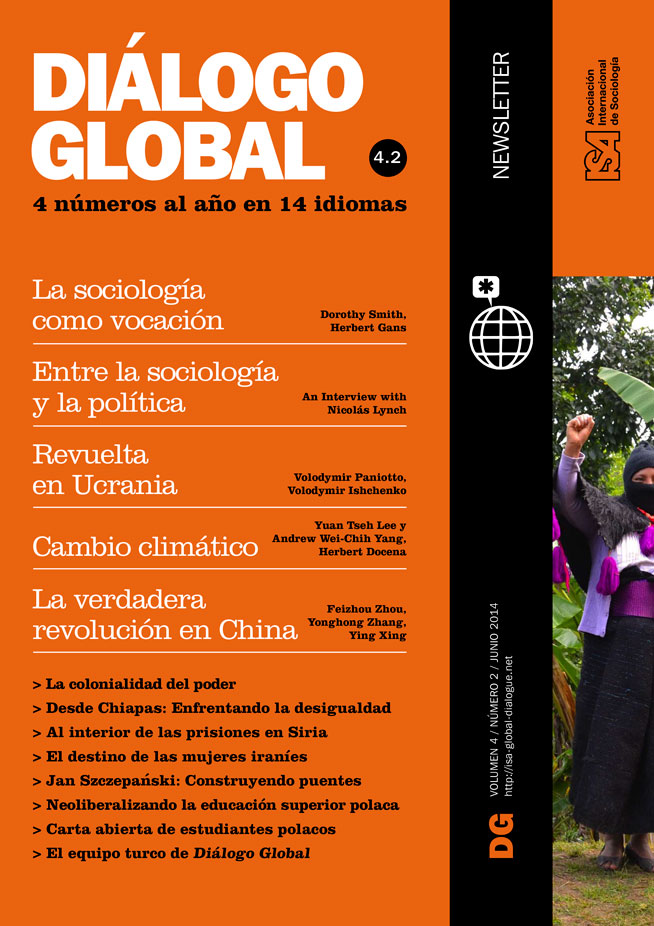Read more about Climate Change
Transforming Human Development
by Yuan Tseh Lee and Wei-Chih Yang
May 16, 2014
As greenhouse gas emissions continue to soar after 20+ years of UN negotiations, world leaders are relying even more heavily on the market to save us from a catastrophic 4-degree centigrade warming; but a coalition of governments and social movements are fighting back. Herbert Docena reports from the UN Climate Change Conference that took place in Warsaw, November 11-22, 2013.
For the second year in a row, a super-typhoon hit the Philippines on the eve of the annual UN climate change conference. To the delegates gathered in Warsaw and to others back home, this added to mounting proof that climate change is not only already happening, but also that those who contributed the least to it are the ones who are being hit hardest.
More than that, Haiyan – along with other extreme-weather events – also reinforced the conclusion, voiced by many in Warsaw, that these UN negotiations have already “failed miserably,” as one delegate put it. Instead of changing course, however, the negotiations are heading towards a more dangerous path. Less divided than before, developed-country governments are leaning even more heavily on the market to solve the problem. But a global movement, embracing governments and social movements with different goals, is also fighting back and pushing for a different direction.
A question of responsibility
The Warsaw conference was just the latest of the increasingly frequent meetings that the world’s governments have been convening since coming together in Stockholm in 1972 to discuss the global ecological crisis. In 1992, governments signed a Convention to “stabilize greenhouse gas concentrations so as to prevent dangerous anthropogenic interference with the climate system.”
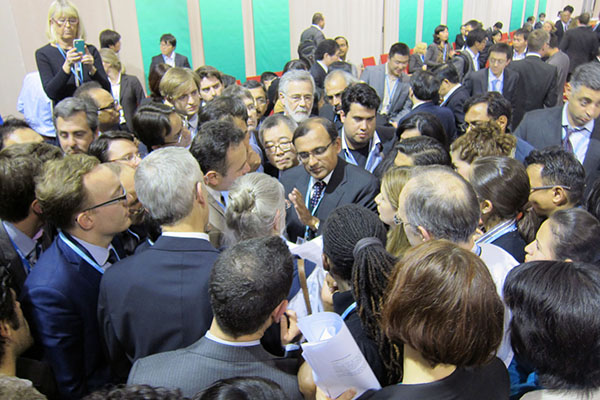
Such a straightforward task has proven to be more daunting, however, because it entails nothing less than interconnected transformations in how we live – from changing light bulbs to overhauling national energy infrastructures to, some insist, replacing capitalism altogether. And like all changes, these transformations are bound to hurt some and benefit others.
Still, there has been a basic consensus on how to proceed: Developed countries are obliged, under the 1992 Convention, to “take the lead” in cutting emissions. But because even their efforts would not be enough, developing countries are also asked to pitch in, and for them to do so they need resources and technology from developed countries. And because they are more vulnerable, but have fewer resources to cope with climate change, they also need help adapting to and coping with its impacts.
This has proven to be more difficult because beneath this basic consensus have been deeper, underlying conflicts, among unequal parties, about the distribution of costs and benefits but also about the meaning of people’s actions and the terms of their relationships with each other – conflicts over what kind of people they are and what kind of treatment they deserve from others.
Fearing that they are being made to bear the burden of solving a problem they neither caused nor benefited from, developing countries insist that rich countries are “morally obliged” to do what they have to do because they are “historically responsible” for emitting much of the gases in the atmosphere and they grew richer in the process. Developed countries have to be compelled and even sanctioned – and not merely given incentives or “invited” – to do the right thing.
Almost all developed-country negotiators I interviewed angrily rejected this, saying they cannot be held responsible for actions whose consequences they were unaware of. If they are to do more now, it is only because they are more capable of leadership or charity – never because they are guilty. They are not the kind of people who can or should be punished – only encouraged.
A question of development
Further complicating matters is that overlapping these struggles over moral status and hierarchies are struggles over how best to sustain or revive growth – or whether this should even be the goal to begin with – in a context of protracted economic downturn.
Responding to growing concern about the environment and to the spectacular rise of popular radical environmental movements which blamed capitalism for the problem in the 70s, officials and experts from OECD countries, the UN, the World Bank, environmentalist groups, and corporations, have put forward, and rallied behind, the notion of “sustainable development”: that solving the global ecological crisis does not have to hinder accumulation; indeed, it depends on – and can even contribute to – continuing growth.
This has since become the taken-for-granted justification and project of many governments, multilateral organizations, and “civil society” groups. All that is needed, they all say, is better “global environmental management” or more regulation over how nature is used. But they have clashed over what that entails.
At one pole, the US has been championing a more neoliberal regulation: The market, not some higher international authority, should be counted on to regulate our access to nature. Countries should only be asked to voluntarily “pledge” their emissions-reductions targets; no caps should be set “top-down.” The promise of higher profits is what should prod capitalists to move from dirty to green energy, or to invest in clean technology projects abroad.
At another pole is the European Union (EU), which had been pushing for something more akin to social-democratic regulation: States acting in concert should take a more direct and active role in enforcing emissions reductions, directing capital flows towards cleaner technology, and so on.
Among capitalists, the main divide has been between those whose fortunes are tied to fossil-fuel or “gray” capitalism and those tied to “green” capitalism, i.e. those involved in renewable energy, carbon trading, and all the profit-making opportunities opened up by climate change. The former find more comfort in the US’ approach while the latter tend to rally behind the EU’s. Invested in both colors of capitalism, others find elements of both agreeable.
The developing-country bloc, which includes over 130 countries, has always been more diverse, but they have generally united behind pushing for redistributive justice to be at the center of solutions, for more state-driven punitive regulation (such as imposing levies and fines), and for subordinating markets to (global) society more broadly.
But there remain internal divisions over larger goals: Many seem to subscribe to the “sustainable development” project articulated by Northern officials and intellectuals, while others have sought to redefine it to mean more than just sustaining capitalist development by conserving nature.
A Failed Compromise
During the early years of the negotiations, the neoliberal no-caps no-commitments approach proposed by the US was quickly shot down after strong opposition from both EU and developing countries. What subsequently prevailed instead was a targets-with-markets or “cap-and-trade” compromise in which developed countries would be given emissions allowances lower than their 1990 emissions while establishing a carbon market where they could buy additional allowances.
Codified in the 1997 Kyoto Protocol, this settlement seemed initially acceptable to both US and EU-led developed-country groupings because it fused market mechanisms (which neoliberals liked) with emissions limits (which the non-neoliberals wanted), but also because it reinforced their common claim of innocence: Unlike the punitive regulation advocated by developing countries, market-based regulation does not stigmatize them as offenders to be punished.
Though largely opposed to market mechanisms and dissatisfied with the low targets, developing countries signed on because legally-binding caps were at least imposed and they were exempt from them, but also because they were promised funds and technology through the market. But this would prove to be too much for those in the US who were particularly incensed not just by the caps but by the exemption granted developing countries – an exemption that was not only seen as a threat to US competitiveness but that also contradicted the US’ moral claim that they are not more guilty than others so their obligations should also be no different from others. The US subsequently ditched the Protocol, while almost everyone else rallied behind it.
After over-ten years of implementation, the compromise achieved little. Some parties managed to reduce their emissions, but only because of slackening growth due to the recession or because they were able to buy cheap “offsets” from the loophole-ridden and now collapsing carbon market. Overall, emissions today are 60-70% higher than when talks began in the 90s. And very little finance or technology has gone into the hands of developing countries.
With the negotiations going around in circles these past years, many in Warsaw had hoped that the most powerful typhoon in recorded history would at least push the negotiations towards a new direction. “We can stop this climate madness here,” pleaded the Philippines’ lead negotiator, who shed tears again during the opening session.
Hurtling towards disaster
What happened instead was that the negotiations continued down a path that had been previously abandoned. And unlike before, when the US-led grouping and the EU wanted to go their own ways, this time they seem to be converging. For even the EU is lining up behind the US – or at least failing to provide a discernible alternative pole as it did in the 90s.
Renouncing caps while favoring carbon trading, more developed-country governments are ditching the cap-and-trade compromise in favor of a no-cap-just-trade deal. Less divided than ever, they are stepping even farther back from more direct regulation, and relying even more on the market to solve the climate crisis.
For as they repeatedly argued during the negotiations, the way to reduce emissions is for states to “catalyze” private-sector investments in green energy by putting a “price” on nature, through the expansion and interconnection of national/regional carbon markets, and by creating an “enabling environment” through liberal investment policies and subsidies – actions that ultimately require “top-down” state action.
The task, as the Canadian negotiator in Warsaw put it, is for the world’s governments to send the message that “climate change is good for business.” And people in business, following the logic of “sustainable development,” are the kind of people who deserve to be courted or appeased – rather than compelled or punished – if they are to save us from the climate crisis. To govern through the market is to effectively entrust the future of the planet to them.
But this turn to an even more neoliberal solution also seems to be galvanizing the opposition. Despite growing fractures within and pressures without, most developing-country governments remained united in insisting that states and not markets should directly ensure that emissions are drastically reduced and that resources and technology are mobilized.
At least part of this uncompromising stance could be attributed to what appears to be the growing influence of left or left-leaning governments such as Venezuela, Bolivia, Ecuador and others within the bloc. Though still pushed to the margins and sometimes even deliberately silenced, negotiators from these countries seemed to have played a leading role in successfully blocking developed countries’ all-out push for “globally-connected carbon markets.” They have also been at the frontlines promoting “Non-Market Mechanisms” or a caps-no-trade approach to reduce emissions – perhaps the most fleshed-out alternative to market solutions ever tabled in the talks.
“Civil society” too seemed to be converging. Around 800 NGO, trade union and social movement representatives – radicals and moderates together – walked out in protest against the direction the process is taking. All these seemed to have slowed the push to vest the fate of the planet in the hands of business. But unless developing-country governments and social movements worldwide are able to exercise real leverage over developed-country governments; unless the international community manages to exercise leverage over all those who make the decisions about what, how much, or with what sources of energy to produce (even in developing countries), the world is now on track to a 4-degree centigrade increase in global temperature – to a world in which Haiyan would be tame by comparison. A force more powerful than super-typhoons is needed to steer us away from that fate.
Herbert Docena, University of California, Berkeley, USA
This issue is not available yet in this language.
Request to be notified when the issue is available in your language.
If you prefer, you can access previous issues available in your language:

